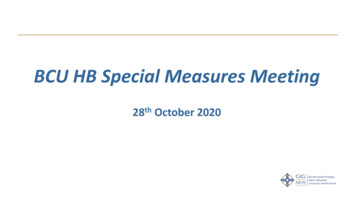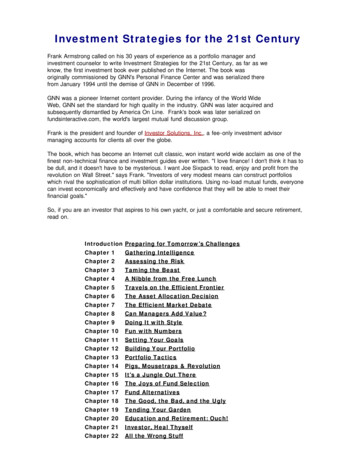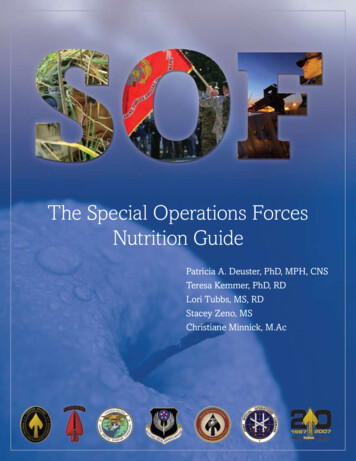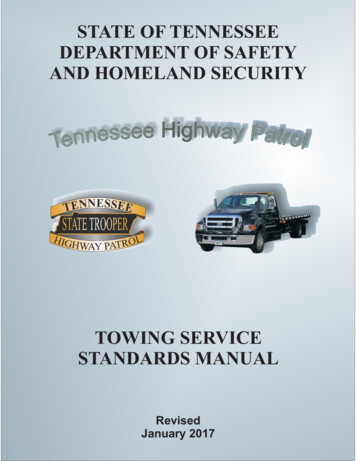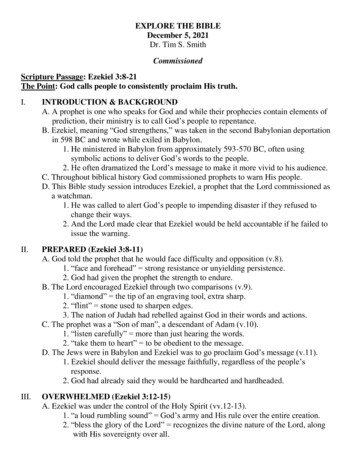
Transcription
EXPLORE THE BIBLEDecember 5, 2021Dr. Tim S. SmithCommissionedScripture Passage: Ezekiel 3:8-21The Point: God calls people to consistently proclaim His truth.I.INTRODUCTION & BACKGROUNDA. A prophet is one who speaks for God and while their prophecies contain elements ofprediction, their ministry is to call God’s people to repentance.B. Ezekiel, meaning “God strengthens,” was taken in the second Babylonian deportationin 598 BC and wrote while exiled in Babylon.1. He ministered in Babylon from approximately 593-570 BC, often usingsymbolic actions to deliver God’s words to the people.2. He often dramatized the Lord’s message to make it more vivid to his audience.C. Throughout biblical history God commissioned prophets to warn His people.D. This Bible study session introduces Ezekiel, a prophet that the Lord commissioned asa watchman.1. He was called to alert God’s people to impending disaster if they refused tochange their ways.2. And the Lord made clear that Ezekiel would be held accountable if he failed toissue the warning.II.PREPARED (Ezekiel 3:8-11)A. God told the prophet that he would face difficulty and opposition (v.8).1. “face and forehead” strong resistance or unyielding persistence.2. God had given the prophet the strength to endure.B. The Lord encouraged Ezekiel through two comparisons (v.9).1. “diamond” the tip of an engraving tool, extra sharp.2. “flint” stone used to sharpen edges.3. The nation of Judah had rebelled against God in their words and actions.C. The prophet was a “Son of man”, a descendant of Adam (v.10).1. “listen carefully” more than just hearing the words.2. “take them to heart” to be obedient to the message.D. The Jews were in Babylon and Ezekiel was to go proclaim God’s message (v.11).1. Ezekiel should deliver the message faithfully, regardless of the people’sresponse.2. God had already said they would be hardhearted and hardheaded.III.OVERWHELMED (Ezekiel 3:12-15)A. Ezekiel was under the control of the Holy Spirit (vv.12-13).1. “a loud rumbling sound” God’s army and His rule over the entire creation.2. “bless the glory of the Lord” recognizes the divine nature of the Lord, alongwith His sovereignty over all.
B. He left bitter and angry (v.14).1. Why? The task, what he had just seen or the rebellion of the people.C. The prophet came to the exiles in Tel Aviv (v.15).1. Ezekiel needed a week to get over the initial shock and hopelessness of whatGod had shown him.2. The prophet felt the weight of impending judgment and identified with thepeople in their crisis.IV.ASSIGNED (Ezekiel 3:16-21)A. “the word of the Lord came to me” Ezekiel’s role as a true prophet (vv.16-17).1. “watchman” complete vigilance to avoid being surprised by a foe.2. God called Ezekiel as His spiritual watchman to preach to Judah and Jerusalem.B. The Lord detailed Ezekiel’s prophetic accountability as a watchman (vv.18-21).C. The Lord’s message is clear: Failure to share His warning carried severeconsequences. Ezekiel would answer for the blood of those he failed to warn (v.18).D. If Ezekiel warned the wicked individuals, but they continued to reject God’s words,they would still die in their sins. However, the prophet would have rescued himself(v.19).E. He still had to warn the righteous (v.20).F. He still needed to warn the righteous and they should remain faithful (v.21).V.CONCLUSION & APPLICATIONA. God provides what believers need to deliver His message.B. The weight of carrying God’s message of judgment against sin can be overwhelmingbut must be carried.C. God expects believers to share the gospel with all they encounter.D. Teaching Ideas1. Create Interesta. Share with the group a time when you faced an overwhelming task andhow you were able to accomplish it.b. What happens if your security systems fails at home?2. Closing Challengea. Ask the group to discuss how The Great Commission compare toEzekiel’s commission.b. This week, pray for “thick skin and a hard head,” like Ezekiel, so that wecan be faithful to share the gospel no matter the response.E. Don’t Forget!!!1. Commissioned & Ezekiel 3:8-212. God calls people to consistently proclaim His truth.Dr. Smith has served churches for over forty years and is a recognized national leader, speaker, and consultant. His ministry assistschurches, associations, state conventions, pastors and leaders with their disciple making ministries and church growth/health strategiessuch as Sunday School, Small Groups and other Discipleship ministries. Dr. Smith is available for conferences, preaching/speakingand for consultations. He can be contacted at tsmith3762@comcast.net.*The CSB version of the Bible and publications from Lifeway Christian Resources are the main sources of information for this study.
EXPLORE THE BIBLEDecember 12, 2021Dr. Tim S. SmithSavesScripture Passage: Ezekiel 11:2-4,14-21The Point: God offers hope in the midst of judgment to those who trust in Him.I.INTRODUCTION & BACKGROUNDA. Hope.1. The world’s definition differs significantly from the biblical description.2. From the world’s perspective, hope is wishful thinking or a sense of what wewant to happen.3. But Christian hope is a trustful expectation that God will continue acting in ourbest interests in the future based on His gracious actions of the past.4. God and what He has done in Christ is the ultimate foundation and object of ourhope as believers.B. The prophet Ezekiel ministered during some of the darkest days of his nation’s history.1. During that time, the people of Judah were experiencing God’s judgmentbecause of their sins.2. Yet even in the midst of that judgment, God promised to ultimately return Hisrepentant people to the promised land and to give them a new heart and a newspirit.II.CALLED OUT (Ezekiel 11:2-4)A. God’s Spirit took Ezekiel in a vision to the east gate of the temple, where the Lordshowed him a group of leaders giving erroneous advice to the remaining residents ofJerusalem (v.2).1. “plot” creating new ideas rather than understanding existing ones.2. “give” their wickedness or incorrectness is doubled.B. These men falsely claimed that Jerusalem was safe, but the Lord called Ezekiel toprophesy against them (v.3).1. “time to build houses” things would soon return to normal.2. “ pot meat ” what was used to protect the meat from the fire whilecooking.a. The fortifications of the city were going to be enough the protect themfrom the coming Babylonian army.b. The civilian and religious leaders would protect them.C. God’s prophet experienced God’s call to deliver His message under His authority(v.4).1. The repetition of prophesy also emphasizes the urgency of Ezekiel’s task.2. These men falsely claimed that the residents left in Jerusalem were secure.
III.GATHERED (Ezekiel 11:14-17)A. Beginning with this verse, the Lord’s message to Ezekiel shifted focus from judgmentto hope (v.14).1. It served as an appropriate response to Ezekiel’s cry in verse 13: “Oh, Lord God!You are bringing the remnant of Israel to an end!”2. Ezekiel’s message did not originate from himself, but with the Sovereign Lord.B. Jerusalem’s residents perceived the exiles as distant from the Lord, both spirituallyand physically (v.15).1. The Jews who had not been deported considered themselves the true remnant,the future hope of the nation.2. “we can’t lose this land because God has promised it to us.”C. The Lord gave Ezekiel the precise words to correct Jerusalem’s false perception(v.16).1. God is sovereign over all.2. Through Ezekiel, the Lord promised to be for the exiles what the temple inJerusalem had once been for them.D. God would regather His people in His promised land for His glory (v.17).IV.SANCTIFIED (Ezekiel 11:18-21)A. Ezekiel called on the people to remove their idols and false gods (v.18).1. “abhorrent acts” connection with idolatry, worshipping idols and linked toimmoral idolatrous rituals.2. “detestable practices” something physical, ritual, or ethical. Most likelyincluded idolatry, homosexuality, human sacrifices, blemished sacrifices,dishonesty toward others, and occult activities.B. The Lord promised a widespread spiritual transformation (vv.19-20).1. In this messianic future, though, they will follow Him with single-hearteddevotion.2. This transformation will remove the hard-hearted and replace it with life that ispliable heart desiring to obey God’s Word.3. The Lord showed Ezekiel a day when His people would return to the promisedland, devoted to Him and delighting in Him.C. God concluded with a warning of judgment for those who refused to repent and followHim (v.21).1. They will pay for their sins!
V.CONCLUSION & APPLICATIONA. Believers are called on to present the truth in the face of false hope.B. Believers find hope in the promises of God’s salvation.C. Believers are called to worship God alone and follow Him obediently.D. Teaching Ideas1. Create Interesta. Ask the group, “When is it most difficult for you to feel God’s presence?”b. State, “Generally, when things are going well for us we feel like God iswith us, and when things are going badly, we don’t.c. In today’s passage, we will see that God may be even more present withus when things are difficult, and that He uses those difficult times tosanctify us and renew our hearts.2. Closing Challengea. Ask the group to discuss, “Even in difficult times, what is God’s promiseto those who trust Him?b. God will always be a sanctuary for those who turn to Him.c. He provides a new heart that can obey God and seek to please Him.”d. Challenge the group to ask God to make their heart sensitive to Him sothey will obediently follow Him.E. Don’t Forget!!!1. Saves & Ezekiel 11:2-4,14-212. God offers hope in the midst of judgment to those who trust in Him.Dr. Smith has served churches for over forty years and is a recognized national leader, speaker, and consultant. His ministry assistschurches, associations, state conventions, pastors and leaders with their disciple making ministries and church growth/health strategiessuch as Sunday School, Small Groups and other Discipleship ministries. Dr. Smith is available for conferences, preaching/speakingand for consultations. He can be contacted at tsmith3762@comcast.net.*The CSB version of the Bible and publications from Lifeway Christian Resources are the main sources of information for this study.
EXPLORE THE BIBLEDecember 19, 2021Dr. Tim S. SmithJudgesScripture Passage: Ezekiel 20:1-14The Point: God judges those who reject Him as Lord.I.INTRODUCTION & BACKGROUNDA. The Israelites entered a covenant with God at Mount Sinai after He graciouslydelivered them from Egyptian bondage.B. While the people’s relationship with the Lord was secure by grace through faith thatcovenant carried conditions.C. The Lord listed curses associated with breaking His covenant and those cursesincluded defeat by Israel’s enemies and exile in foreign lands.D. The Ten Commandments constituted the heart of the Sinai covenant, but the Israelitesrepeatedly broke those commands.E. In His grace, however, the Lord patiently waited hundreds of years before sending Hisjudgment upon the promised land.F. He repeatedly sent His prophets to warn His people of the inevitable consequences ofpersistent disobedience.G. The people refused to correct their ways and a day of reckoning ultimately came.H. The Lord allowed the Babylonians to conquer Judah’s inhabitants and send them intoexile away from the promised land.I. Ezekiel recorded the details of Judah’s rebellion and the Lord’s message of judgment.J. The Lord said He would purify them through judgment and exile.II.CONFRONTED (Ezekiel 20:1-4)A. This took place about four years before the fall of Jerusalem and the destruction of theTemple in 587-586 BC (v.1).1. “elders” older as well as community leader, any request they make should behonored.2. “inquire” they were wanting to know what was going to happen and for theLord to fix it for their benefit and protection.3. “the Lord” they used God’s covenant name Yahweh, they were namedropping.B. He delivered a message to the elders on God’s authority, not his own (vv.2-3).1. “Lord God” repeated His name to remind them that He was sovereign over all.2. “as I live” He was swearing an oath and it would come to pass.3. The elders were not in the proper spiritual condition to make a request of God.
C. The people needed to hear the Israelites’ past transgressions because those sins alsocharacterized Ezekiel’s generation (v.4).1. “detestable practices” idolatry, homosexuality, human sacrifices, blemishedsacrifices, dishonesty, and occult activities.D. God refused to listen to Israel’s elders when they sought Him through Ezekiel.E. Instead of giving them what they sought, the Lord instructed Ezekiel to confront thesinful practices they had carried out over the years.III.EARLY SIGNS (Ezekiel 20:5-9)A. Israel should have known beyond a shadow of a doubt that the prophet’s words werenot his own because for the third time the Lord says in this chapter (v.5).1. He had taken the initiative to choose them.2. He swore to be their God.3. He revealed Himself to them, made Himself known.B. God promised them a new homeland more beautiful than anything they could imagine(vv.6-7).1. They were to get rid of their sinful lifestyles.2. “that you prize” sin was more important than God to them.C. They didn’t do what the Lord had commanded and He thought about letting them diein the wilderness (v.8).D. God didn’t give them what they deserved in order to preserve His reputation with thenon-believers (v.9).IV.REPEATED REBELLION (Ezekiel 20:10-14)A. The Lord recounted His deliverance of the elders’ ancestors from Egyptian bondage(vv.10-11).1. God gave them His guidelines for living and taught them thoroughly to them,they had no excuse for not following them.2. “the person who does them will live by them” the Lord graciously shared thegodly principles for life at its best.B. The Sabbaths were the weekly and special reminders of His presence and protection aswell as their pledge to follow only Him (v.12).C. They rebelled against God (vv.13-14).1. “put an end to them” getting rid of all of them, wiping them out and no future.2. Does it do God’s reputation more good or damage it by not judging sin?3. “So that I might be honored” – will being gracious or judging sin bring honor toGod?D. Ezekiel’s generation had imitated the Israelites’ rebellious legacy, so the nation’sdownfall would shortly occur.
V.CONCLUSION & APPLICATIONA. God confronts unrepentant sinners with the truth.B. God acts with mercy for the sake of His name.C. Repeated rebellion against God leads to facing His judgment.D. Teaching Ideas1. Create Interesta. Ask the group to discuss what characteristics make a good judge in ourlegal system.2. Closing Challengea. Ask your group to reflect on their thoughts and attitudes toward God. Askthem to answer this question, “would you say that your thoughts andattitudes reflect obedience toward God or rebellion against God?b. Lead the group to pray and ask the Holy Spirit to reveal any areas inwhich they need to repent and to pray for the strength to yield those areasof rebellion to God.E. Don’t Forget!!!1. Judges & Ezekiel 20:1-142. God judges those who reject Him as Lord.Dr. Smith has served churches for over forty years and is a recognized national leader, speaker, and consultant. His ministry assistschurches, associations, state conventions, pastors and leaders with their disciple making ministries and church growth/health strategiessuch as Sunday School, Small Groups and other Discipleship ministries. Dr. Smith is available for conferences, preaching/speakingand for consultations. He can be contacted at tsmith3762@comcast.net.*The CSB version of the Bible and publications from Lifeway Christian Resources are the main sources of information for this study.
EXPLORE THE BIBLEDecember 26, 2021 (Merry Christmas)Dr. Tim S. SmithSoughtScripture Passage: Matthew 2:1-12The Point: God provides salvation to those seeking Him.I.INTRODUCTION & BACKGROUNDA. The wise men recognized the importance of a personal encounter with the newbornKing so they began a journey to find Him.B. Guided by the star God placed in the sky, they eventually fulfilled their quest inBethlehem.C. Matthew contrasted Christ with evil King Herod.D. The treasures the wise men brought were typically associated with royalty.E. Herod faked his devotion and sought to destroy this One he considered a threat.II.THE ARRIVAL (Matthew 2:1-3)A. After Jesus’ birth, wise men followed a star that led them to Jerusalem (v.1).1. Herod was a wicked ruler and was always paranoid of others, even his ownfamily.2. The wise men were non-Jews philosophers and priests who mixed astronomicalobservation with astrological speculation.3. They may have been from Babylon, Persia, or the Arabian Desert so theirjourney may have taken as long as two years.4. They could have learned something about Jewish messianic expectations fromexiles like Ezekiel.B. They arrived in Jerusalem and asked about the new King of the Jews (v.2).C. Herod had a bad reputation and when he was anger, everyone got worried (v.3).III.THE DIRECTION (Matthew 2:4-8)A. Troubled by news of a recently born King of the Jews, Herod began to act (v.4).1. “chief priests” the leaders over the twenty-four main orders of priests.2. “scribes” during the exile this group became the experts on the Law.3. Where was the Messiah going to be born?B. These students of the Scripture recognized Micah 5:2 as a messianic prophecy andBethlehem of Judea as the Messiah’s birthplace so they provided for Herod thelocation of Christ’s birth (vv.5-6).C. Herod wanted to know how old the child would be in order to kill Him (vv.7-8).
IV.THE DISCOVERY (Matthew 2:9-12)A. As the wisemen headed toward Bethlehem, the star reappeared and led them to thehouse where they found Jesus (vv.9-10).1. Jesus was older than an infant when the wise men arrived.2. The wise men were extremely joyful after a long hard journey.B. The wisemen worshiped Christ and presented Him with gold, frankincense, and myrrh(v.11).1. The symbolism in these gifts: gold suggests royalty, incense relates to Christ’sdivinity, and myrrh represents His death and burial.2. Also helped provide finances for the families escape to Egypt.C. God intervened and sent the wisemen home without revisiting Herod (v.12).V.CONCLUSION & APPLICATIONA. Some are seeking God and His salvation while some aren’t.B. Some misunderstand the truth of the gospel while others want to silence it.C. Jesus can be found by those wanting to worship Him.D. Teaching Ideas1. Create Interesta. Ask the group, “do you collect anything, what’s the most treasured item inyour collection?” Follow it up by asking, “how much time and/or moneywould you invest to add to your collection?”b. Say, “In today’s study the wisemen received something of eternal valueand they sought to worship Jesus the Messiah.”2. Closing Challengea. The wisemen had great joy, they were humble and they sacrificed in theirgiving. Do you have those same characteristics in your following ofJesus?b. Make the commitment to truly worship the Messiah this week.E. Don’t Forget!!!1. Sought & Matthew 2:1-122. God provides salvation to those seeking Him.Dr. Smith has served churches for over forty years and is a recognized national leader, speaker, and consultant. His ministry assistschurches, associations, state conventions, pastors and leaders with their disciple making ministries and church growth/health strategiessuch as Sunday School, Small Groups and other Discipleship ministries. Dr. Smith is available for conferences, preaching/speakingand for consultations. He can be contacted at tsmith3762@comcast.net.*The CSB version of the Bible and publications from Lifeway Christian Resources are the main sources of information for this study.
EXPLORE THE BIBLEJanuary 2, 2022 (Happy New Year)Dr. Tim S. SmithWarnsScripture Passage: Ezekiel 28:11-19, 25-26The Point: God offers grace to the humble and brings down the proud.I.INTRODUCTION & BACKGROUNDA. In this week’s study, the Lord warned of certain judgment on arrogant nations andindividuals.B. This Scripture passage reminds us that God brings down the proud but offers grace tothe humble.C. One of the prophecies against seven specific regions is the focus of our study, Tyre.II.PAST GLORY (Ezekiel 28:11-15)A. God moved His prophet to speak out against the pride of Tyre and its king.1. This Phoenician city-state felt secure in its seaside location and its economicsuccess (vv.1-5).2. But the Lord assured Tyre that its pride would be its downfall (vv.6-10), and itscollapse would be catastrophic.B. The Lord directed His warning to Tyre’s ruler (vv.11-12).1. “lament” a poem chanted or sung during mourning rituals.2. “seal of perfection” they thought they had it all together, perfect planning withperfect systems of commerce resulting in perfect success.3. “full of wisdom and perfect in beauty” they thought they had it together.C. The king’s arrogance led the Lord to use the analogy of Satan in the garden of Eden(v.13).D. God had done everything to make them successful but they still choose the wrong way(v.14).E. He was a good king until his arrogance consumed him (v.15).III.REBELLION DENOUNCED (Ezekiel 28:16-19)A. The king achieved great wealth through commercial trade, but his consuming passionfor material gain opened the city to a variety of vices (v.16).1. “violence” the same word is used to describe the world prior to the flood inNoah’s time.2. The Lord seems to be using the analogy of Satan’s downfall to lament thedownfall of Tyre’s king.
B. Tyre’s king became so consumed with haughtiness that he turned up his nose at God(v.17).1. The king’s wisdom related to his ability to make money and the beauty of thecity resulted from financial success.2. “threw him down to the ground” The Lord would bring disaster and utterdefeat on the king of Tyre, just as He had brought down pride-filled Satan.C. They worshipped false gods and the king’s death would be sudden and horrible (v.18).D. The king that had previously been respected was now seen as the greatest failure(v.19).1. They would have a horrific end and there would be no coming back.IV.HOPE STIRRED (Ezekiel 28:25-26)A. After dealing with the king of Tyre, the Lord told Ezekiel to prophesy againstPhoenicia’s other major city-state, Sidon (vv.20-24).1. God’s judgment against Sidon would be just as devastating as His vengeanceagainst Tyre’s pride and arrogance.2. But He quickly moved from judging other nations to a reminder of the blessingsahead for His people.B. By regathering Israel, the Lord would demonstrate His holiness to the nations (v.25).1. This was God’s promise!C. There would be a season of peace and safety (v.26).D. “they will know ” an intimate personal relationship.V.CONCLUSION & APPLICATIONA. A person’s true character will be revealed in time.B. Selfish pride leads to sin and judgment by God.C. Grace is found in repentance that leads to holy living.D. Teaching Ideas1. Create Interesta. Ask the group to discuss the various warning systems we have in our dailylives. What is the result when we ignore those warning indicators?2. Closing Challengea. Discuss the difference between being humbled and being humiliated. Askthe group “which does God desire for you?”E. Don’t Forget!!!1. Warns & Ezekiel 28:11-19, 25-262. God offers grace to the humble and brings down the proud.Dr. Smith has served churches for over forty years and is a recognized national leader, speaker, and consultant. His ministry assistschurches, associations, state conventions, pastors and leaders with their disciple making ministries and church growth/health strategiessuch as Sunday School, Small Groups and other Discipleship ministries. Dr. Smith is available for conferences, preaching/speakingand for consultations. He can be contacted at tsmith3762@comcast.net.*The CSB version of the Bible and publications from Lifeway Christian Resources are the main sources of information for this study.
EXPLORE THE BIBLEJanuary 9, 2022Dr. Tim S. SmithOffersScripture Passage: Ezekiel 37:1-14The Point: God brings life to His people.I.INTRODUCTION & BACKGROUNDA. This session emphasizes that God still brings life to people who place their completetrust in Him.B. Summary of Ezekiel.1. Chapters 1-24: judgment messages focused on the fall of Judah (sometimesdesignated Israel) because the people had rebelled against the Lord.2. Chapters 25-32: emphasized God’s sovereignty as the prophet pronounced doomon the pagan nations surrounding God’s people.3. Beginning in chapter 33, the book’s tone changes, as the Lord offers hope forrestoration on a disciplined Israel.C. Ezekiel’s vision of dry bones coming to life in chapter 37 vividly portrays the Lord’smiraculous renewal of His people from the grave of exile back to the promised land.II.THE POTENTIAL (Ezekiel 37:1-6)A. In chapter 36, God promised to bring His people back to their land where they wouldprosper again.B. God gave Ezekiel a powerful vision affirming this new life for Israel (v.1).1. The vision came from the Lord.2. The valley was full of bones, not skeletons but dried, bleached and separatedfrom one another.C. He was careful around these bones and they had apparently been exposed for a longtime (vv.2-3).1. The bones were like the exiled people of Israel, they had no hope of life.2. Ezekiel said that the Lord could do anything.D. God authorized Ezekiel to proclaim a message to exiles (v.4).1. The people had not heeded the prophets message before.2. Now the Lord says for them to obey!E. God would bring life into these old dead bones (vv.5-6).1. Only He could do it.2. “know” a close, personal relationship.III.THE PRESENTATION (Ezekiel 37:7-10)A. He proclaimed and the bones came together and skin covered them but no life (vv.78).B. He was to proclaim the message that life and hope only came from God (v.9).1. Sounds like the act of creation found in Genesis 2:7.2. “slain” violently murdered.
C. Ezekiel prophesied, breath entered the bodies and they came to life (v.10).1. “life” the ability to experience everything, both good and bad.2. “vast army” power/strength as well as a large number.D. The transition of these bones to bodies portrayed Israel’s ultimate national restorationand their spiritual renewal.IV.THE PROMISE (Ezekiel 37:11-14)A. God interpreted the dry bones as representing the people of Israel, a reference to boththe Northern and Southern Kingdoms (v.11).1. “Our bones are dried up” strong and might, but the people believed all that hadbeen sucked out of them.2. “our hope has perished” any idea of anything good happening had died!3. “cut off” violent separation from what is known and removed from God’sprotective care.B. The Lord was going to initiate a new exodus (vv.12-13).1. “graves” a metaphor for their exile.2. “my people” covenant renewal and spiritual restoration.3. “know” close personal relationship.4. The Lord also repeated His promise to bring His people up from their graves.5. This promise stresses the revival of the nation as a supernatural act of divinepower.C. The revival and renewal would be the work of God (v.14).1. His presence would be with them.2. They would have life in the promised land.3. They would have peace and prosperity.V.CONCLUSION & APPLICATIONA. God calls on believers to see the potential in all lost people.B. God uses believers to bring new life to those who are dead in their sins but will trust inJesus Christ.C. God offers hope for a future to those who trust in Him.D. Teaching Ideas1. Create Interesta. Ask the group to discuss why people like home fixer upper shows.2. Closing Challengea. When did you realize your need for God?b. Offer an invitation for members to receive salvation.E. Don’t Forget!!!1. Offers & Ezekiel 37:1-142. God brings life to His people.Dr. Smith has served churches for over forty years and is a recognized national leader, speaker, and consultant. His ministry assistschurches, associations, state conventions, pastors and leaders with their disciple making ministries and church growth/health strategiessuch as Sunday School, Small Groups and other Discipleship ministries. Dr. Smith is available for conferences, preaching/speakingand for consultations. He can be contacted at tsmith3762@comcast.net.*The CSB version of the Bible and publications from Lifeway Christian Resources are the main sources of information for this study.
EXPLORE THE BIBLEJanuary 16, 2022 (SBC Sanctity of Life Day)Dr. Tim S. SmithValuesScripture Passage: Ezekiel 16:20-21; 23:36-39; Psalm 139:13-16The Point: God values all human life.I.INTRODUCTION & BACKGROUNDA. You’ll have people in your group that have had an abortion or they know someonethat has had one.1. There is still great pain and remorse for those that have made that decision.2. There may even be some guilt that can only be expressed through anger andbitterness.3. There may be people in your group that believe abortion is ok.B. “But I teach a senior adult class!”1. These are the folks that need to teach our young the truth of God’s Word.2. Stand for and proclaim the truth of God’s Word.II.WRONGDOING IS JUSTIFIED (Ezekiel 16:20-21)A. Through child sacrifice God’s people blatantly broke their covenant with Him (v.20).1. Scripture reminds us that children are a gift of God (Ps. 127:3).2. “food” they allowed their children to be consumed by the false gods.3. Wasn’t it enough that your sin had ruined your life but to allow it to ruin yourchildren, how awful you must be!B. God’s people had adopted the practice of sacrificing their children to idols—something the Mosaic law strictly forbade (v.21).1. “slaughtered” connected with sacrificial rituals.2. Some ancient records indicate the children were placed in a hollow bronze statuewith the body of a human and the head of an ox. A fire was then built below thestatue, and sacrif
2. The prophet felt the weight of impending judgment and identified with the people in their crisis. IV. ASSIGNED (Ezekiel 3:16-21) A. “the word of the Lord came to me” Ezekiel’s role as a true prophet (vv.16-17). 1. “watchman”
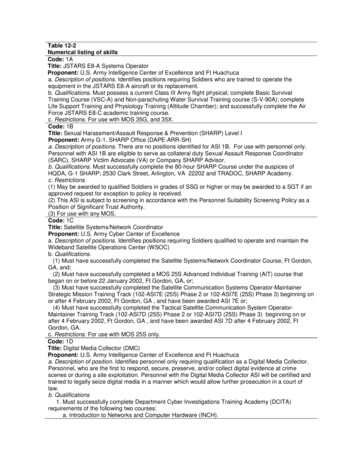
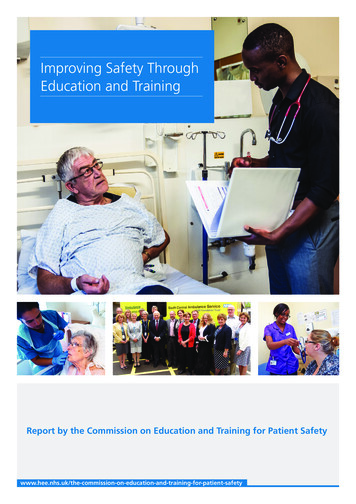
![[] 9 IA NCLUDING R THE R OF F](/img/1/modern-auditing-chapter09.jpg)

